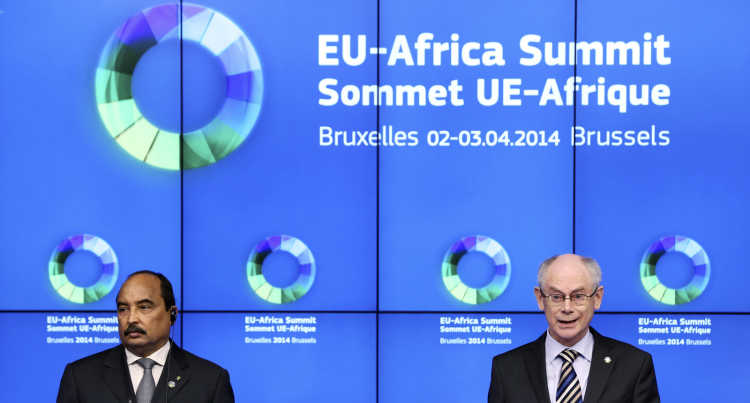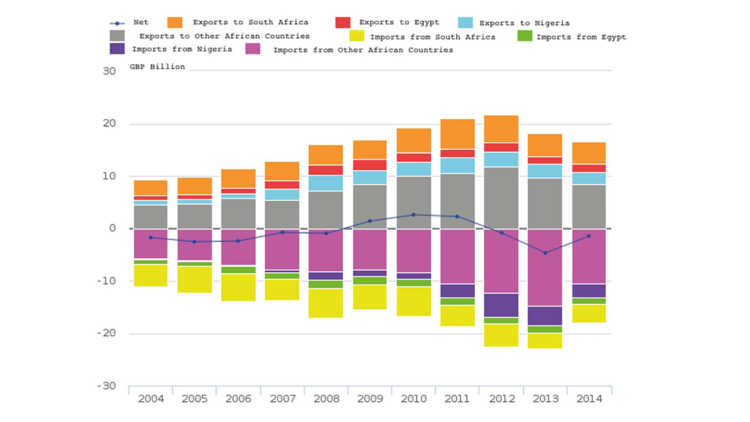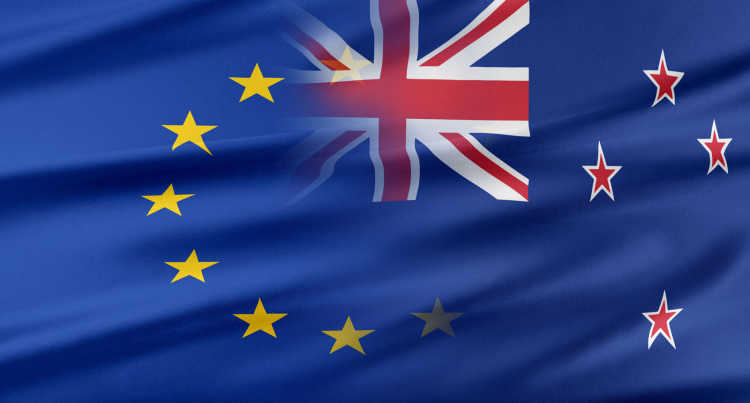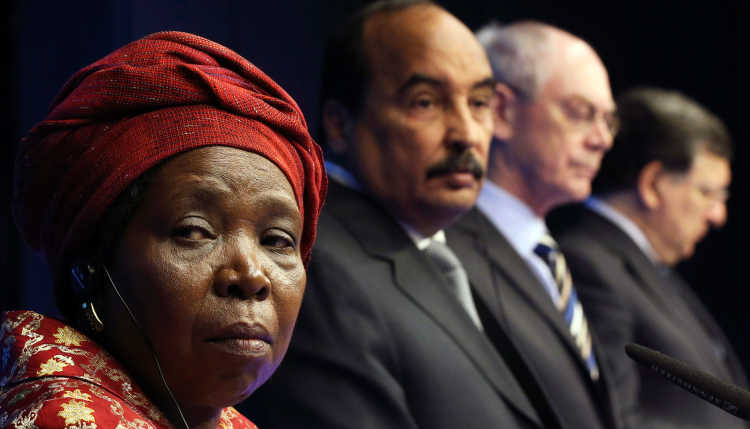- Home
- Publications
- GIGA Focus
- Brexit Beyond the UK’s Borders: What It Means for Africa
GIGA Focus Africa
Brexit Beyond the UK’s Borders: What It Means for Africa
Number 3 | 2016 | ISSN: 1862-3603

The result of the United Kingdom’s referendum on leaving the EU, which was held on 23 June 2016, has profound geopolitical, economic, and social implications for Africa. This is all the more the case given the bilateral UK–Africa relationship and interregional Africa–EU relations.
In economic terms, those African countries that rely most on trade with the UK – Nigeria, South Africa, Egypt, and Kenya – will suffer in the event of a recession in the UK. They will also feel the uncertainty that comes with renegotiating economic partnerships, which could take years.
A recession in the UK would also call into question the country’s ability to fulfil its aid and development commitments. Initial evidence suggests that the new government’s focus will be more on strengthening trade relations than helping those most in need.
African states will lose an important advocate within the EU, creating a climate of uncertainty around economic relations. In the past, the UK has advocated for the reform of the EU’s Common Agricultural Policy, even though it has failed to secure substantive changes.
The withdrawal of the UK from the EU Common Security and Defence Policy will have implications for the EU’s security practices in Africa. It will affect the financial contributions to EU-led support for the African Peace and Security architecture, and thus donors’ ability to maintain much needed support in this area.
Brexit challenges the European integration project and the EU’s credibility in promoting regional integration. However, it also presents learning opportunities for the process and pace of regional integration in Africa.
Policy Implications
The results of Brexit and its immediate aftermath, particularly the cabinet of the new British prime minister Theresa May, are not inspiring for African perceptions of the UK. While the new British government will focus on securing short-term economic benefits, African countries will increasingly turn towards other funding and trading partners such as China, Brazil, or India. The remaining European countries will need to counter Britain’s exit from the European Union by increasing their engagement in trade, development, and security policies in Africa.
Britain Votes Exit – What Comes Next?
The result of the United Kingdom’s referendum on leaving the EU, which was held on 23 June 2016, is having and will have profound effects on global and domestic political, economic, and social landscapes. Much of the focus in the early days of Brexit was on the implications for other EU member states and the UK itself, with an emphasis on the economy. However, given the UK’s relationship to Africa, as well as existing Africa–EU relations, it is worth reflecting on the broader implications this seemingly European decision has for its African partners.
The British government’s lack of preparation for a “leave” win became very clear through its reaction not only to the referendum result, but also to the implications for the devolved governments in Scotland and Northern Ireland. The chaos that followed the Brexit vote called into question the democratic credibility of British politics, as the whole world, including African states, watched. Furthermore, the exit of one of the EU’s larger member states undoubtedly calls into question the general idea of regional integration, a project which Africa is invested in for its own continent.
The appointment of Theresa May as prime minister represents a new chapter for the UK. However, her record as a lawmaker in the areas of social welfare, equality laws, or public economic and social goods has not inspired confidence. And although the transition from Cameron to May indicates some leadership around the process of exiting the EU, the unwillingness of the government to formally invoke Article 50 to trigger the UK’s exit has further enhanced the uncertainty. The British exit from the European Union will have profound implications for Africa–EU and UK–Africa relations in terms of trade, development policy, and the peace and security architecture, areas which we reflect upon below.
Implications for Economic Relations in Trade and Development
On the economic front, the pound sterling fell significantly against all major currencies including the euro and approximately GBP 200 billion were wiped off the stock exchanges in the first week following the referendum alone. It is in the trade and development area that we see the greatest implications for Africa.
The EU’s position as Africa’s most important trading partner, and the role the UK plays in this trading relationship, means that the Brexit will undoubtedly have consequences in Africa. For example, the possibility of a recession in the UK was hotly debated before the referendum and has been even more so since the vote to exit. The significant fall of the pound sterling after the referendum results were announced and the economic shock to the stock markets in the days after the vote point to this possibility, which is also discussed in a more recent analysis on the topic (see Chadha 2016). If a full-blown recession were indeed to take place, it would trigger a downturn in international trade and investment, with negative impacts on the EU’s and the UK’s African economic partners. It is, however, crucial to state that the Brexit will not affect all African countries in the same way, because the UK accounts for only 4.3 per cent of Africa’s total exports (Office for National Statistics 2016).
In the short to medium term, it is those countries whose economies most rely on trade with the UK that will feel the effects of Brexit, while other countries – for instance, those from the CFA zone such as Cote d’Ivoire, Guinea, or Cameroon – will be less affected. As Figure 1 shows, South Africa, Nigeria, and Egypt are the UK’s most important trading partners on the African continent, with imports to the UK from these countries totalling GBP 7.4 billion in 2014 alone. Other African countries accounted for GBP 10.5 billion of UK imports in 2014. Another major area of economic relations is foreign direct investment (outward FDI): in 2014, the value of the UK’s stock of FDI in Africa was GBP 42.5 billion (Office for National Statistics 2016). The UK is one of the main foreign investors in Kenya (UK Trade & Investment 2015), with companies such as Safaricom, East African Breweries, or fruit and vegetable producers being owned partly by British shareholders. Moreover, between 1995 and 2014 the UK was South Africa’s seventh-largest export market. This fact, together with the recent weakening of the South African rand, means the British exit from the EU will have negative indirect consequences for South Africa. This will especially be the case if further unfavourable conditions in the UK require British companies to reconsider and decrease their investments in Africa.

Despite these possibilities, another scenario might be a situation where Africa becomes worse off than it currently is, but the UK actually sees improvement in its economic outlook. UK companies currently control large swathes of land in Africa containing mineral reserves including gold, copper, platinum, coal, and diamonds (Kabemba 2014). While this is seemingly positive, the distribution of this mineral wealth in Africa (and the UK) is confined to a very small elite (Curtis 2016). There is a gap between how much comes into such countries from the UK via loans, aid, and remittances and how much goes out in profit for British shareholders. Companies’ potential ability to negotiate independently of perceived EU ethical restrictions in future could allow these inequalities to become further entrenched.
The Politics of Aid and Development
Just as the UK’s voice in EU trade negotiations will be missed, the loss of its pro-development voice will represent a blow to Africa’s development aspirations. As one of the main contributors to the EU development aid budget, the UK’s departure from the EU undoubtedly raises questions as to whether the level of aid given by the EU to Africa will be sustained, and whether the current British contribution will actually be reinvested in aid when its current commitments expire. Unless the definitive answer to these two concerns is YES, then African countries will generally lose out. A potential change in the level of aid from the EU and the UK would occur for the following reasons.
In the period 2008–2013, the UK was the third-largest provider of funding to the European Development Fund (EDF), behind Germany and France (Independent Commission for Aid Impact 2012). It has thus been one of the most important supporters of EU aid programmes in Africa, both politically and financially. This was manifested in the UK’s advocacy within and outside the EU for rich countries to commit 0.7 per cent of their gross national income (GNI) to developing countries in accordance with a 1970s UN agreement. In 2015, the UK became the first G7 country to enshrine this in law. In addition, it met the commitment by spending approximately 0.72 per cent on official development assistance (ODA) in that year (approximately GBP 11 billion).
There is no reason to think the UK’s general commitment to ODA will not continue following Brexit – it is a cornerstone of the country’s development identity. However, the economic losses that the UK has already suffered and will suffer in the short to medium term call into question not only its ability to fulfil this commitment, but also the value of 0.7 per cent of GNI in real terms. In times of economic uncertainty, politicians play the blame game to shore up political support, and international development has always been the scapegoat. We might see a situation wherein the legal regulation that commits the UK to 0.7 per cent of GNI is repealed, especially given that the new secretary for development, Priti Patel, actively campaigned against this commitment, calling the work of her current department “low priority” and for the department to be abolished (The Independent, 14 July 2016).
Indirect Implications: The UK’s Absence in EU Policy Negotiations
While Britain’s exit from the EU will have direct implications for economic relations as well as development aid, it will also be indirectly felt in negotiations on the EU’s foreign policies vis-à-vis African countries. Since Britain’s entry into the Common Market, the EU’s relationship with the developing world has expanded to include former British colonies via the African, Caribbean, and Pacific Group of States (ACP). Through this relationship, the EU (including its member states) has become the largest aid donor in the world. The ACP itself is a sizeable trading bloc and has facilitated cooperation among the countries of the developing world. To a certain extent, this EU–ACP relationship has allowed all EU member states to benefit from preferential access to these markets and to gain leverage in new international trade negotiations.
Because the EU has long negotiated as one bloc with third parties, Brexit means all the benefits enjoyed by African countries in terms of preferential access will no longer be available vis-à-vis the UK. As Britain leaves the EU, it will have to renegotiate its economic partnership agreements (EPAs) with Africa, a process that can take years and that could leave economic relations with the major African economies such as South Africa, Kenya, and Nigeria in uncertainty. Moreover, it has been argued that the UK’s departure from the EU will also mean the loss of third-partner voices within the EU. For example, while the British government has been a supporter of EPAs, in the negotiations with African countries it has been viewed as an advocate for these countries, ensuring that they are compensated in those cases where they lose out due to new modes of cooperation. Other European countries will now dominate these negotiations.
Further, the UK has been seen as one of the more influential countries to honour the EU’s commitment to ODA. Its exit means that Luxembourg, Sweden, and Denmark will lose their most powerful ally in this regard. As British financial contributions to EU aid programmes will decrease, so will its influence within the EU’s aid package negotiations, especially regarding the EU’s Common Agricultural Policy (CAP). The subsidies for European farmers in the framework of CAP have for years been criticised as a competitive advantage that creates an unbalanced economic playing field for African farmers. In 2011, then environment secretary Caroline Spelman stated, “We’re in a situation where there are global problems with food security, economic uncertainty and the loss of biodiversity. Reforming the CAP is the best opportunity in a generation to take a major step forward in dealing with all of these problems” (cited in The Guardian, 11 October 2011). Although it has not actually overseen any changes, the UK has in recent years advocated for the reform of the CAP. African countries will now lose their strongest supporting voice in their fight for CAP reform.
Peace and Security Implications
The EU is currently the main contributor to African countries’ security aspirations, primarily through the development of the African Peace and Security Architecture (APSA) (Haastrup 2013a). Between 2004 and 2014, the EU contributed EUR 740 million to the African Peace Facility and has committed the same amount for the period 2014–2016. Through this scheme, the UK has been able to contribute continentally rather than bilaterally to African peace and security. Although the opaqueness of peace and security practice means we only know that the UK is the third-largest contributor to the African Union’s (AU) African Peace Facility (which is funded by the European Development Fund), the UK has been particularly instrumental in peace support operations on the continent. The case of the African Union Peace Support Operation in Somalia (AMISOM) is especially notable. Within the EU, the UK emerged as the most prominent advocate for dedicating funding to AMISOM, as part of the broader responses to land and maritime insecurity experienced by Somalia. In addition to pushing for this financial support, the UK has been a lead partner with the AU in designing the strategy for peace and stability in Somalia. Indeed, in a review of the Common Foreign Security Policy, the UK Parliament identified Somalia as a key priority of the UK’s work within the EU security architecture.
However, when the UK exits the EU, it will have to negotiate separate support and engagement agreements. This will result in extra administrative costs for the AU. While the current funds are secured until 2020, the funding model will change significantly with the British exit from the EU. In places such as Somalia, African partners will lose the political leadership of the UK in the context of an EU partner. Moreover, unless the UK’s divorce from the EU is entirely amicable, the demand for coherence among donors will be further fractured. Also, while the UK has gained a measure of legitimacy via the EU in its relationships with African countries, it remains to be seen whether this relative cordiality between the UK and many of its former colonies will continue bilaterally.
Brexit has implications for the EU’s Common Security and Defence Policy (CSDP) missions, the majority of which take place in Africa. In the context of the CSDP, the UK has always been a strong advocate for peacebuilding and conflict prevention. This is in contrast to the French approach of a stronger military focus as the main peace and security practice. The British exit from the EU implies that the British approach to peace and security will be less prevalent within the EU institutions and among EU member states. The withdrawal of the UK might thus translate into an identity change for the EU’s security architecture and its security practices in Africa, especially if France reasserts its dominance. Although militarism is increasingly being questioned in the current global context – including Africa – as a solution to insecurity, the discourse generated by Brexit, which prioritises traditional understandings of national interest through strong and pre-emptive militaries, also raises important questions about the UK’s approach to security in Africa. But above all, the UK’s exit underscores the anxieties regarding the UK’s multilateral relationships – with Europe and the world.
Impact on Regional Integration Trends
Brexit fundamentally calls into question the EU’s credibility in promoting regional integration. In recent years, Africa has intensified its own regional integration project. Specifically, it is fair to say that the main policy drivers for the EU’s African counterpart, the AU, have been the free movement of goods, the free movement of labour, visa-free regimes, and open borders, among others. While the AU itself is not modelled on the EU, AU elites have often viewed the EU as a successful version of some of its own aspirations. Moreover, the AU itself relies on the EU as its main external donor in these endeavours.
In Africa, regional integration is seen as fundamental to increasing intra-Africa trade, peace, sustainability, and inclusion, and to decreasing the violent conflicts that are so devastating for people and states on the continent. Greater regional integration will enable the interactions of people from different cultures to fulfil the pan-African dreams of kinship and cooperation, while also positioning the countries of the continent as a bloc within various global governance architectures. If Brexit is perceived as a failure in the process of regional integration, then it certainly problematises the continued consolidation of integration on the continent.
Yet, regional integration in Africa does not show any signs of deceleration. In the weeks since Brexit, the African passport has been announced as the next phase in facilitating the free movement of people – even though free movement is one of the main points of contention in the Brexit negotiation process. These diverging dynamics fundamentally challenge the dominant scholarship on regional integration that sees the EU as a model in Africa (see also Haastrup 2013b). However, Brexit may overemphasise some of the short-term costs of integrating while giving voice to disgruntled states (Allison 2016). In particular, it will embolden those countries already reticent about pooling sovereignty in the medium term and those people fighting to retain control over foreign policies. Nevertheless, the fallout of Brexit in the UK has, so far, also provided a teaching moment for Africans more generally by showing the negative consequences of dissolving a regional alliance (Institute for Peace and Security Studies 2016). It has provided an opportunity for African politicians and bureaucrats to press for the advantages of regional integration more vigorously (see Allison 2016).
As we have shown, there are certainly lessons to learn, especially on the part of Africa, regarding regional integration. However, there are also opportunities. The EU enjoys a privileged position in Africa, and through it, the UK has also enjoyed one as well. In the wake of Brexit, African governments will continue to consolidate their relationships with relatively new partners such as China, Brazil, or India. Normatively, this is positive if it fosters effective South–South cooperation. It also presents an opportunity for African countries to assert leverage, together or bilaterally, when the time comes to negotiate new international agreements with the UK in trade, development, or security. And while the UK has benefited from the legitimacy of the EU for many years in post-independence Africa, this is the opportunity to face up to the past, if the claims of fostering new engagements with the Commonwealth are to bear any fruit.
Undoubtedly, Brexit will have direct and indirect implications for EU–Africa relations. Yet, going forward, the aftermath of the referendum represents an opportunity for a new strategic orientation of the EU’s economic, development, and security engagement in Africa. The remaining member states now have the opportunity to strengthen the European case with this new strategic orientation while extolling and exporting its benefits to Africa without imposition.
Conclusion
The implications of the vote in favour of Brexit extend beyond Europe’s boundaries and into Africa. If we take into account the historical context of Africa–EU relations, Brexit is, on the one hand, a sentimental loss. After all, it was the British entry into the European Community that brought about the largest transregional initiative in the world via the EU–ACP relationship, a cornerstone of Africa’s relationship with Europe as well as its economic and development agenda.
On the other hand, and as we have shown above, Brexit will have significant material implications too. Although the new British prime minister Theresa May has hit the ground running in terms of establishing her new cabinet, her appointments are not inspiring for UK–Africa relations, particularly the appointment of Priti Patel, an outspoken critic of the sort of work the UK conducts at the bilateral level through the Department for International Development (DfID). The PM’s choice and the realities of the UK’s economic landscape further expose Brexit’s potential impact on African partners. Moreover, long-term cooperation on peace and security between African countries through the AU, its security architecture, and the EU is also uncertain. The president of the European Council, Donald Tusk, has recently tried to reassure external partners that the EU’s external relations will continue as normal. While it would be naïve to assume that the current situation in peace and security, development, and trade relations will continue as is given all of the above, Brexit also presents important opportunities for Africa, Europe, and the UK.
Footnotes
References
Allison, Simon (2016), Analysis: Does Brexit Undermine the Case for African Regional Integration?, in: Daily Maverick, 27 June, www.dailymaverick.co.za/article/2016-06-27-analysis-does-brexit-undermine-the-case-for-african-regional-integration/#.V72NH5MrKYU (24 August 2016).
Chadha, Jagjit S. (2016), The Referendum Blues: Shocking the System, in: National Institute Economic Review, 237, F4–F8.
Curtis, Mark (2016), The New Colonialism: Britain’s Scramble for Africa’s Energy and Mineral Resources, in: War on Want, London, http://media.waronwant.org/sites/default/files/TheNewColonialism.pdf?_ga=1.180793125.348677378.1471540418 (24 August 2016).
Haastrup, Toni (2013a), Charting Transformation through Security: Contemporary EU-Africa Relations, Basingstoke, New York: Palgrave Macmillan.
Haastrup, Toni (2013b), EU as Mentor? Promoting Regionalism as External Relations Practice in EU-Africa Relations, in: Journal of European Integration, 35, 785–800.
Independent Commission for Aid Impact (2012), DFID’s Oversight of the EU’s Aid to Low-Income Countries (2 September 2016).
Institute for Peace and Security Studies (2016), Brexit: Lessons Learnt for Regional Integration in Africa, Addis Ababa, www.ipss-addis.org/new-ipss/news-events/brexit-_lessons_learnt_for_regional_integration_in_africa (24 August 2016).
Kabemba, Claude (2014), Undermining Africa’s Wealth, in: Open Society Initiative for Southern Africa (18 August 2016).
Office for National Statistics (2016), The UK’s Trade and Investment Relationship with Africa: 2016. Recent Changes in the UK’s Trade and Investment Relationship with Africa, www.ons.gov.uk/economy/nationalaccounts/balanceofpayments/articles/theukstradeandinvestmentrelationshipwithafrica/2016 (24 August 2016).
Stone, Jon (2016), The New International Development Secretary Wanted to Scrap What Is Now Her Department, in: The Independent, 14 July, www.independent.co.uk/news/uk/politics/new-international-development-secretary-priti-patel-called-for-department-for-international-a7137331.html (24 August 2016).
UK Trade & Investment (2015): Doing Business in Kenya: Kenya Trade and Export Guide, www.gov.uk/government/publications/exporting-to-kenya/exporting-to-kenya (24 August 2016).
General Editor GIGA Focus
Editor GIGA Focus Africa
Regional Institutes
Research Programmes
How to cite this article
Ansorg, Nadine, and Toni Haastrup (2016), Brexit Beyond the UK’s Borders: What It Means for Africa, GIGA Focus Africa, 3, Hamburg: German Institute for Global and Area Studies (GIGA), http://nbn-resolving.de/urn:nbn:de:0168-ssoar-48153-8
Imprint
The GIGA Focus is an Open Access publication and can be read on the Internet and downloaded free of charge at www.giga-hamburg.de/en/publications/giga-focus. According to the conditions of the Creative-Commons license Attribution-No Derivative Works 3.0, this publication may be freely duplicated, circulated, and made accessible to the public. The particular conditions include the correct indication of the initial publication as GIGA Focus and no changes in or abbreviation of texts.
The German Institute for Global and Area Studies (GIGA) – Leibniz-Institut für Globale und Regionale Studien in Hamburg publishes the Focus series on Africa, Asia, Latin America, the Middle East and global issues. The GIGA Focus is edited and published by the GIGA. The views and opinions expressed are solely those of the authors and do not necessarily reflect those of the institute. Authors alone are responsible for the content of their articles. GIGA and the authors cannot be held liable for any errors and omissions, or for any consequences arising from the use of the information provided.








